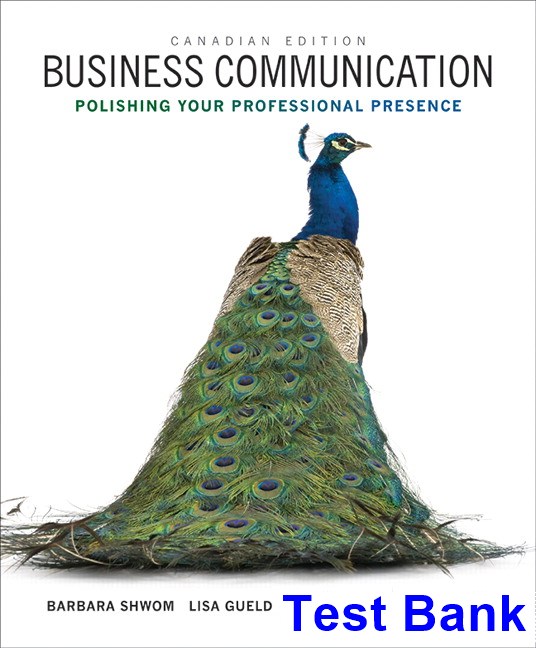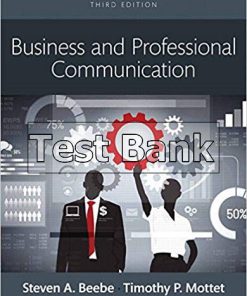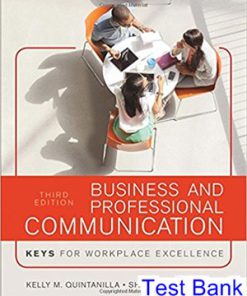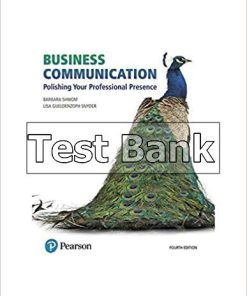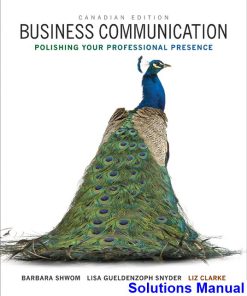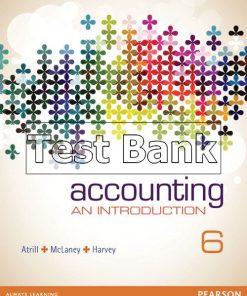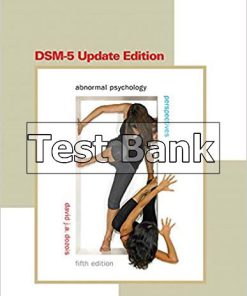Business Communication Polishing Your Professional Presence Canadian 1st Edition Shwom Test Bank
$50.00 Original price was: $50.00.$26.50Current price is: $26.50.
Business Communication Polishing Your Professional Presence Canadian 1st Edition Shwom Test Bank.
Instant download Business Communication Polishing Your Professional Presence Canadian 1st Edition Shwom Test Bank pdf docx epub after payment.
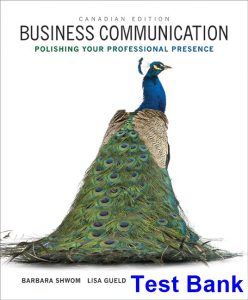
Product Details:
- ISBN-10 : 0133427668
- ISBN-13 : 978-0133427660
- Author: Barbara Shwom; Lisa Gueldenzoph Snyder; Liz Clarke (Author)
Table of contents:
- Chapter 1 Introduction
- SQ1 Why is It Challenging to Communicate Well?
- Communication is a Complex Process
- Communication is Affected by Context
- Communication is More Than Transmission of Messages
- SQ2 What are the Benefits of Being a Good Communicator?
- Effective Business Communicators have a Competitive Edge in the Job Market
- Communication Skills Will Contribute to Your Company’s and Your Own Success
- Communication Skills Will Make You a More Valuable Employee
- Communication Skills May Improve Your Salary
- Good Communication Skills Can Improve Your Personal Life
- SQ3 What Characteristics Will Help You Communicate Effectively?
- Being Strategic
- Purposeful
- Audience-Oriented
- Persuasive
- Being Professional
- Appropriate to the Situation
- Clear and Concise
- Ethical
- Being Adaptable
- Current with Technology and Social Media
- Choosing the Best Technology for the Task
- Avoiding Technology Traps
- Adapting Familiar Technology to Business Use
- Able to Work with Diverse Cultures and Ages
- Collaborative
- SQ4 What Other Important Career Skills will This Textbook Help You Develop?
- End of Chapter Study Questions in Review
- SQ1 Why is it Challenging to Communicate Well?
- SQ2 What are the Benefits of Being a Good Communicator?
- SQ3 What Characteristics Will Help You Communicate Effectively?
- SQ4 What Other Important Career Skills Will This Textbook Help You Develop?
- Visual Summary
- Key Terms
- Review Questions
- Critical Thinking Questions
- Key Concept Exercises
- SQ1 Why is it Challenging to Communicate Well?
- SQ2 What are the Benefits of Being a Good Communicator?
- SQ3 What Characteristics Will Help You Communicate Effectively?
- SQ4 What Other Important Career Skills Will This Textbook Help You Develop?
- Writing Exercises
- Collaboration Exercises
- Social Media Exercises
- Speaking Exercises
- Grammar Exercises
- References
- 2 Working with Others Interpersonal, Intercultural, and Team Communication
- Study Questions
- Chapter 2 Introduction
- SQ1 What Listening Skills Will Help You Communicate Better with Others?
- Hearing Accurately
- Comprehending and Interpreting
- “Listen” to Nonverbal Communication
- Ask Questions and Paraphrase to Ensure Understanding
- Be Aware of Gender-specific Communication Styles
- Evaluating
- Responding
- SQ2 How Can You Help Others Be Good Listeners When You Speak?
- Focus on Your Audience
- Share the Conversation
- Use Clear, Concrete, Unambiguous Language
- Support Your Message with Good Nonverbal Communication
- Avoid Language That Triggers a Negative Response
- Frame Negative Comments Positively
- SQ3 How Can You Manage Interpersonal Conflict?
- Identify the Cause of the Conflict
- Competing Goals
- Differences of Opinion
- Faulty Assumptions
- Relational Issues
- Ego Issues
- Select an Appropriate Management Technique
- SQ4 How Can You Improve Your Communication with People from Different Cultures?
- Understand How Cultures Differ
- High Context Versus Low Context
- Individualism Versus Collectivism
- Power Distance
- Uncertainty Avoidance
- Time Orientation
- Develop Strategies That Help You Communicate with Diverse Groups
- SQ5 How Can You Work Effectively as Part of a Team?
- Assemble an Effective Team
- Agree on Team Goals and Standards
- Pay Attention to Team Development and Dynamics
- Develop Good Leadership Practices
- Plan for Effective Meetings
- Be a Good Team Member
- End of Chapter Study Questions in Review
- SQ1 What listening skills will help you communicate better with others?
- SQ2 How can you help others be good listeners when you speak?
- SQ3 How can you manage interpersonal conflict?
- SQ4 How can you improve your communication with people from different cultures?
- SQ5 How can you work effectively as part of a team?
- Visual Summary
- Key Terms
- Review Questions
- Critical Thinking Questions
- Key Concept Exercises
- SQ1 What listening skills will help you communicate better with others?
- SQ2 How can you help others be good listeners when you speak?
- SQ3 How can you manage interpersonal conflict?
- SQ4 How can you improve your communication with people from different cultures?
- SQ5 How can you work effectively as part of a team?
- Writing Exercises
- Collaboration Exercises
- Social Media Exercises
- Speaking Exercises
- Grammar Exercises
- References
- 3 Managing the Communication Process Analyzing, Composing, Evaluating
- Study Questions
- Chapter 3 Introduction
- SQ1 What Are the Benefits of Analyzing?
- Analyzing the Purpose Focuses the Message
- Analyzing the Audience Helps You Meet Their Needs
- Analyzing the Content Ensures a Complete Message
- Analyzing the Medium Helps You Choose the Best Delivery Option
- SQ2 What is Involved in Composing?
- Deciding When and Where to Compose
- Organizing the Message
- Drafting the Content
- Designing a Professional Format and Delivery
- Email Messages
- Memos
- Letters
- Voice Mail Messages
- SQ3 How Does Evaluating Improve Your Communication?
- Evaluating Content Helps You Achieve Your Purpose and Outcome
- Evaluating for Style Improves Readability and Comprehension
- Clarity
- Conciseness
- Cohesion
- Coherence
- Evaluating for Tone Helps You Project a Professional Image
- Evaluating for Correctness Increases Your Credibility
- Familiarize Yourself with Five Types of Errors
- Proofread Systematically to Check for Errors
- Reviewing Feedback Helps You Become a Better Communicator
- End of Chapter Study Questions in Review
- SQ1 What are the benefits of analyzing? (pages 81–87)
- SQ2 What is involved in composing? (pages 87–96)
- SQ3 How does evaluating improve your communication? (pages 96–105)
- Visual Summary
- Key Terms
- Review Questions
- Critical Thinking Questions
- Key Concept Exercises
- SQ1 What are the benefits of analyzing? (pages 81–87)
- SQ2 What is involved in composing? (pages 87–96)
- SQ3 How does evaluating improve your communication? (pages 96–105)
- Writing Exercises
- Collaboration Exercises
- Speaking Exercises
- Social Media Exercises
- Grammar Exercises
- References
- Part 2 Delivering Effective Messages
- 4 Communicating Routine Messages and Building Goodwill
- Study Questions
- Chapter 4 Introduction
- SQ1 How Do You Compose Messages Containing Questions and Requests?
- Decide Between a Direct or an Indirect Message
- Provide Reasons for the Request
- Adopt a “you” Perspective and Include Audience Benefits
- Conclude with Gratitude and a Call for Action
- SQ2 How Do You Compose Informational Messages?
- Reply to Questions with a Direct Answer
- Respond to Customer Requests and Comments by Creating Goodwill
- Highlight Key Points in Confirmation Messages
- Organize Routine Announcements so They Are Easy to Skim
- Format Instructions so Readers Can Easily Follow the Steps
- Keep Text and IM Messages Short and Focused
- SQ3 What Kinds of Messages Build Goodwill in Business Relationships?
- Thank-you Messages
- Congratulatory Messages
- Sympathy Messages
- “For-your-information” Messages
- End of Chapter Study Questions in Review
- SQ1 How do you compose messages containing questions and requests?
- SQ2 How do you compose informational messages?
- SQ3 What kinds of messages build goodwill in business relationships?
- Visual Summary
- Key Terms
- Review Questions
- Critical Thinking Questions
- Key Concept Exercises
- SQ1 How do you compose messages containing questions and requests?
- SQ2 How do you compose informational messages?
- SQ3 What kinds of messages build goodwill in business relationships?
- Writing Exercises
- Collaboration Exercises
- Social Media Exercises
- Speaking Exercises
- Grammar Exercise
- References
- 5 Communicating Persuasive Messages
- Study Questions
- Chapter 5 Introduction
- SQ1 How can the ACE Process Help You Persuade Your Audience?
- Analyzing Helps You Plan Your Message
- Analyze Your Purpose, Desired Outcome, and Business Result
- Analyze Your Audiences’ and Stakeholders’ Needs
- Analyze Medium Choices
- Composing Implements the Persuasive Plan
- Evaluating Helps You Review the Draft for Effectiveness
- SQ2 What are the Basic Elements of Persuasion?
- Building Credibility
- Constructing a Logical Argument
- Appealing to Your Audience’s Emotions
- Appeal to Your Audience’s Emotional and Psychological Needs
- Make Appeals Based on Widely Studied Psychological Principles
- Pre-Suade Your Audience Before Delivering Your Message
- Show Your Own Emotional Commitment
- Use Storytelling and Powerful Language to Make Evidence Compelling
- SQ3 What Types of Business Messages Typically Require Persuasion?
- Recommendations for Action
- Requests for Favors
- Analyze
- Compose
- Evaluate
- Persuasive Customer Claims
- Analyze
- Compose
- Evaluate
- Sales Messages
- End of Chapter Study Questions in Review
- SQ1 How can the ACE Process Help You Persuade Your Audience?
- SQ2 What are the Basic Elements of Persuasion?
- SQ3 What Types of Business Messages Typically Require Persuasion?
- Visual Summary
- Key Terms
- Review Questions
- Critical Thinking Questions
- Key Concept Exercises
- SQ1 How can the ACE Process Help You Persuade Your Audience?
- SQ2 What are the Basic Elements of Persuasion?
- SQ3 What Types of Business Messages Typically Require Persuasion?
- Writing Exercises
- Collaboration Exercises
- Social Media Exercises
- Speaking Exercises
- Grammar Exercises
- References
…
People also search:
business communication polishing your professional presence 4th edition
business communication polishing your professional presence pdf
what is business communication in business communication
business communication course benefits
examples of email in business communication
Instant download after Payment is complete
You may also like…
Business
Business Communication Polishing Your Professional Presence 2nd Edition Shwom Solutions Manual
Business
Business Communication Polishing Your Professional Presence 3rd Edition Shwom Solutions Manual
Solutions Manual
Business Communication Polishing Your Professional Presence 4th Edition Shwom Test Bank
Solutions Manual
Business and Professional Communication in a Digital Age 1st Edition Waldeck Test Bank


